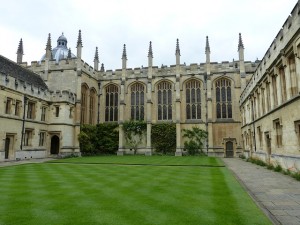
Dear ______:
Sorry if I burst your bubble when I said that Seminary can’t really be your church for the next few years.
It really depends on what kind of seminary you chose. Like it or not, choosing just about any Protestant seminary means your school doesn’t even try to be a church.
Don’t worry: seminary can still be a fantastic source of Christian community. It all comes down to knowing what kind of seminary you chose, and knowing what the Church is.
(We should probably be more accurate and say the seminary can’t be your “congregation,” since the “Church” is the bigger version of the Body of Christ, crossing all the boundaries of time, space, and culture. The Church is manifested in each congregation. Of course Christ’s life, the life of the Church, is found wherever we gather in his name, but it is not always reasonable to slip into saying a particular community is a church as we do with a congregation.)
There are lots of ways to categorize seminaries. If you are interested I’ll say more in another letter, but for now the key distinction is Protestant vs. Non-Protestant.
An Orthodox and Catholic Model
If you were training to be a Catholic or Orthodox priest, chances are your seminary would feel, and act, much more like a congregation — in the same way that a monastery feels and acts very much like a congregation.
Seminary would be a very intentional community, with multiple daily services for liturgical prayer, even if not the full cycle of monastic “hours.” The students would be immersed in the worship life of the larger Church, and that would be a key part of their sustenance and formation.
I know of at least one seminary of this kind that even celebrates the Eucharist every Sunday morning. They clearly aim to function as their students’ congregation — or their monastery.
And that can work when a seminary is built on on the model of monastic life. Time in seminary is time away from the world, focusing intensely on spiritual formation. As one friend described it, “It was ‘boot camp’ to prepare us for spiritual warfare.”
It won’t be a completely monastic experience, since it is also built around taking courses toward an academic degree, but that is where the community leans.
A Protestant Model
Every part of this is different in the typical Protestant seminary, like the one you chose. Here the balance tips the other way — toward being a graduate professional school.
Chapel worship in seminaries I’ve known ranges between once per week to every weekday. And worship in chapel is always optional — with either guilt or rebelliousness among non-attendees, and hand wringing about low attendance from the more devoted.
But it isn’t just the number of chapel services: In Protestant seminaries chapel worship is often a kind of workshop or learning lab, in which students experiment with styles and grow in skills.
(The result can be amazing or appalling. I will spare you my tragic and comic recollections.)
You may well think voluntary chapel with student leadership is the right approach, but it does highlight how our seminaries are less focused on spiritual formation. We let autonomous individuals choose their own path to growth.
If a Protestant seminary does try to make spiritual formation a central focus, there will be resistance. Both faculty and students will struggle.
- Is it going to take away from academic priorities?
- Will it be framed as a class? And how can it be graded?
- Will all the professors have to participate — and will they be competent to do so?
- Is the whole thing maybe just too Catholic?
Protestant seminaries tend to put a great deal of their emphasis on being graduate professional schools. Spiritual formation tends to take second place.
What kind of seminary is this?
This isn’t a critique. Seminaries have to live in two worlds: They serve their denominations, and the larger Church. But they are also degree-granting institutions, under the regulations of accrediting boards and governments.
So you need to think about what kind of seminary you are attending. You need to think about your own spiritual needs as you grow as a disciple and prepare for ministry.
If your seminary sees itself as a graduate professional school, and not as a church, where will you find the kind of full, broad experience of worship, formation, and mission that you intend to preach and teach to others once you graduate?
Find yourself a congregation, my friend.
Blessings,
Gary

Word.
Thanks Brint!